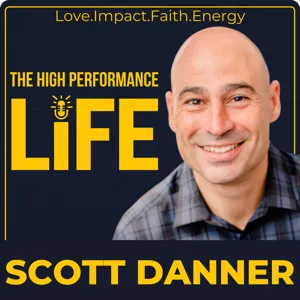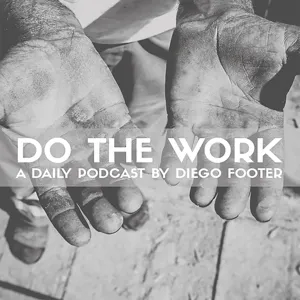Podcast Summary
CVS Health's Approach to Holistic Care: CVS Health offers various health services including in-person and virtual care, in-home evaluations, mental health services, and pharmacy services, emphasizing a holistic approach to care.
CVS Health is committed to providing comprehensive health services to individuals in various ways. This includes partnerships with Oak Street Health and Aetna for in-person and virtual care, in-home evaluations through Signify Health, and mental health services. Additionally, CVS Pharmacy and CVS Specialty are part of this network, ensuring eligibility and services vary by location and individual. Christian Jarratt, a cognitive neuroscientist and deputy editor of Psyche magazine, emphasized the importance of surrounding oneself with people who influence personal growth. He shared how his quiet demeanor as a child led teachers to label him as shy, but when he went to university, making friends with an extrovert helped him come out of his shell. Overall, CVS Health's approach to holistic care and Christian's personal growth journey demonstrate the potential for continuous improvement and living according to one's values.
The interplay between personalities, relationships, and biology: Our personalities can change due to new relationships and environments, and research shows links between personality traits, brain activity, structure, inflammation markers, and gut bacteria.
Our personalities can be significantly influenced by our relationships and environments. This was exemplified in the speaker's experience during their time at university and in England. The new friendships and environments helped them feel more outgoing and gregarious, but biology also played a role. Research suggests that personality traits can be linked to brain activity, structure, inflammation markers, and even gut bacteria. The speaker mentioned Colin De Jong as a leading researcher in this field. Overall, this discussion highlights the complex interplay between our personalities, relationships, and biology.
Experiences and Influences Shape Our Personality: Biology doesn't determine our personality. Physical health, roles, and social influences can shape our personality traits.
Our personality is not set in stone by our biology, but rather shaped by various experiences and influences throughout our lives. Biology plays a role, but it doesn't determine our fate. One such influence is our physical health. By taking care of ourselves through exercise and healthy habits, we can improve our personality traits. Another significant influence is the roles we take on in life. The feedback and expectations associated with these roles can shape our personality, leading to increases in conscientiousness and other desirable traits. Research has shown that social influences, such as peers, can have a greater impact on personality development than genetics. Therefore, it's essential to recognize the power of experiences and relationships in shaping who we become.
Parents' influence on children's personalities is modest: Parents can't deliberately sculpt their kids' personalities, but warm, encouraging, and consistent parenting benefits development.
While parents do influence their children's personalities to some extent, the impact is relatively modest compared to unique experiences outside the home and peer influences. Parents should aim to be warm, encouraging, and consistent, as this style is beneficial for a child's personality development. However, parents cannot deliberately sculpt their kids into having specific personalities. Extreme forms of maltreatment, such as neglect or abuse, can lead to attachment problems and harm children's mental health. There are individual differences in how much genes and environment interact, with some children being more sensitive to their environment (orchid children) and others being relatively impervious (dandelion children). The interaction between genetics and environment is complex, and the impact of parenting on children's development depends on both the child's genetic disposition and the quality of their upbringing.
Environment and genes shape personality differently for each person: Supportive environments can foster curiosity and exploration, while malnourished environments can lead to anxiety traits. Happy events like becoming a parent can have complex effects on personality, with some research suggesting decreased self-esteem, increased neuroticism, and decreased conscientiousness.
While environment and genes interact to shape personality, the extent to which they do so varies among individuals. Some people are more influenced by their environment, while others are more genetically predisposed to certain traits. For instance, a supportive environment can foster curiosity and exploration in some individuals, while a malnourished environment can lead to anxiety traits in others. Moreover, happy events, such as becoming a parent, can have complex effects on personality, with some research suggesting that the immediate aftermath of parenthood can lead to decreased self-esteem, increased neuroticism, and decreased conscientiousness. This is likely due to the overwhelming and chaotic nature of parenthood, which can be confusing and challenging for individuals. Further research is needed to explore how different parenting styles impact the development of various personality traits in children, such as those labeled as "orchids" or "dandelions." Overall, these findings highlight the importance of individual differences and the role of experiences in shaping personality throughout the lifespan.
Genetics and individual circumstances shape parent-child dynamics: Parenting styles can be influenced by parents' traits and circumstances, and child behavior may have a genetic component, emphasizing the complexity of parent-child relationships
Genetics and individual circumstances play significant roles in shaping the complex dynamics between parents and children. The discussion touched upon the idea that some parents may exhibit more stability or variation in their parenting styles, depending on their own traits and circumstances. Additionally, the genetic component of child behavior was mentioned, suggesting that difficult children may have challenging parents as well. The conversation also introduced the concept of the Lemon Juice Personality Test, which, although not scientifically proven, aims to measure sensitivity to stimulation, potentially linking it to introversion. However, it was noted that the test has its limitations and controversies. The overall discussion emphasized the complexity of human behavior and the importance of considering various factors when understanding parent-child relationships.
From Extremist to Peace Advocate: Evidence for Personal Growth: People, including those with challenging personality disorders, can change and grow throughout their lives. Transformation requires introspection, support, and motivation.
Despite the prevalence of cancel culture, which often seeks to punish and exclude individuals for past mistakes, there is evidence that people, even those with challenging personality disorders, can change and grow throughout their lives. This was a key theme in the speaker's research and was exemplified by the case of Majid Nawaz, who transformed from an extremist to a peace advocate after a period of introspection in jail. However, changing one's personality is not an easy feat, especially for those who do not recognize the need for change or believe they are already perfect. The challenges of intentional, deliberate personality change are unique and significant, particularly for those with personality disorders. Despite these hurdles, there is growing evidence that such individuals can be helped and can help themselves with the right support and motivation.
Working with individuals without insight into their harmful ways: Devious ways to work with those without insight into their harmful behaviors include framing interventions in a self-interested way to increase empathy and improve success.
While some individuals with personality disorders, such as narcissistic personality disorder, may have insight into their harmful ways of relating to others and the world, not all do. For those without insight, there are devious ways to work with them, such as framing interventions in a self-interested way, like increasing empathy to improve their success. There's evidence that US presidents may display psychopathic traits, particularly the subtrait of fearless dominance, which can be beneficial for making important decisions. However, it's important to remember that having high scores in one subtrait does not necessarily mean a high score in psychopathy overall. For instance, a surgeon with high fearless dominance could also have compassion, making them an ideal professional in their field.
The Impact of Mindset on Performance and Well-being: Adopting a challenge mindset towards challenges can lead to better performance, increased confidence, and a more positive outlook on demanding situations.
Our mindset towards challenges can significantly impact our performance and well-being. The discussion touched upon the presence of psychopathic traits in certain professions, such as surgeons and CEOs, and how these traits can manifest differently among individuals. While some argue for the importance of recognizing subtraits, others suggest collapsing them into broader categories. A challenge mindset, as opposed to a threat mindset, was introduced as a valuable concept in dealing with demanding situations. Those with a challenge mindset view the situation as an opportunity for growth and learning, rather than a threat to their abilities. Sports psychology is one area where this concept has been applied, with athletes being encouraged to adopt a challenge mindset through various techniques, such as rituals and reframing their thoughts. Extroverts, being more optimistic by nature, are believed to be more inclined towards a challenge mindset. Overall, adopting a challenge mindset can lead to better performance, increased confidence, and a more positive outlook on challenging situations.
Understanding Personality Traits on a Continuum: Identifying and shifting the distributions of personality traits can lead to significant changes in our lives, even if it's a subtle shift
Our personality traits, such as extroversion and neuroticism, are not black and white but rather exist on a continuum. Extroverts are drawn to rewards and opportunities, while neurotic individuals are sensitive to threats and fearful of punishment. However, it's important to recognize that we all have varying degrees of these traits, and identifying and shifting the distributions of these traits can lead to significant changes in our lives. For instance, a neurotic extrovert might benefit from increasing their willingness to take risks and being more extroverted in certain situations. This can lead to new opportunities and experiences, such as networking events or accepting invitations. It's essential to remember that personality development doesn't require a profound change but rather a subtle shift in our distributions, which can have a massive impact on our lives.
The Power of Small Shifts in Behavior and Personality: Small changes in behavior and personality can lead to significant consequences in life. Personal growth is possible within scientific parameters, and intergenerational dialogue can provide valuable insights. Businesses in need of financial support can explore revenue-based funding solutions.
Small shifts in behavior and personality, as discussed in Christian's book, can have significant consequences in life. Christian's work emphasizes that personality change is possible within scientific parameters, and he acknowledges the contributions of researchers like Scott. Tiffany and Tamika, the hosts of TMI and Across Generations respectively, appreciate the focus on this topic and invite listeners to tune in for intergenerational conversations. Additionally, Green Star Capital Funding offers revenue-based funding solutions for businesses in need of financial support. The conversation emphasizes the importance of personal growth, the value of intergenerational dialogue, and the availability of resources for business growth.





